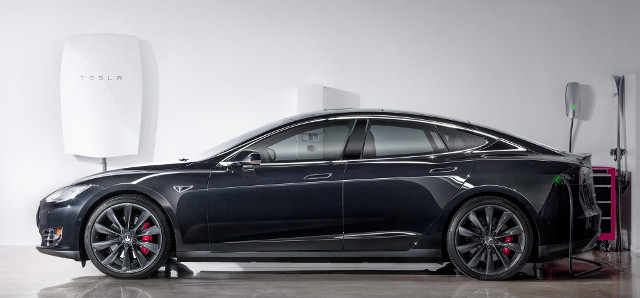Tesla’s announcement of batteries for power storage caused a lot of turmoil last week. Kartikeya Singh analyses the significance of the product for the power market and sees it as part of a global trend towards energy decentralization.

Not only green, but also cool. (Photo by Tesla Motors)
The announcement by Tesla CEO Elon Musk of the launch of its latest product, the Tesla Powerwall battery, has many people in the renewable energy community cheering. The arc of energy generation and distribution has gone through phases over time starting from localized systems and moving towards larger but less resilient centralized systems. The centralized system and the sources that power it has brought billions of people out of poverty thanks to economies of scale. They have not been without their hurdles however; not only are these systems heavily reliant on fuels that cause climate change, but they have failed to deliver for the nearly 1.6 billion people for whom the grid is still a distant dream (or at best, an erratic one). For example, the politics of playing with grid infrastructure and energy prices has left the distribution systems in one of the largest economies in the world, India, with a grid network that is overburdened and inadequate to meet the growth needs of the country.
Innovations in technologies that produce energy (such as solar and wind) have over time brought new mixes of energy into existing networks for distribution. What has lacked is a breakthrough that can deal with intermittency of renewables in that system or the ability to store it when it is generated. Off-grid energy solutions, particularly for the developing world, have for decades been too small and not been able to genuinely get people up the energy ladder as their livelihoods improve. While business models and the technology, particularly solar, have matured, the Holy Grail for the scaling of low-carbon technologies is the battery. Perhaps Tesla’s new innovation is the breakthrough that allows the energy system to break from the existing framework for distribution. At long last, the arc of energy generation and consumption may be headed towards a decentralized model, at least for household energy.
Where it gets more exciting for emerging markets and those still living in the dark, is that the market for the adoption of such technologies already exists. Due to an erratic supply of electricity through the existing grid, the business of batteries and “inverter” systems in a nation like India, one with 400 million people still living in the dark, is booming. If Tesla is truly open sourcing its technology design then the gains for millions of people will be big. Countries like India and China have the power to bring down the costs of manufacturing the design further from the existing price point of $3500 per 10kWh unit. In fact, thanks to the manufacturing strength of China, the costs of solar photovoltaic panels have been dramatically reduced worldwide. These countries can also continue the innovation process and improve the battery as needed.
The fact that other companies in the US are also gearing up for the battery market is a hopeful sign. The technology must of course deliver and people from Wall Street to Main Street will be watching the progression of this technology. But, the real action will come when Tesla and its partner companies take the technology over seas.
Kartikeya Singh is a PhD candidate at The Fletcher School and CIERP Doctoral Research Fellow, received his Master of Environmental Science degree at the School of Forestry & Environmental Studies at Yale University. His research interests include climate change and energy policy, innovation and the geopolitics of energy use.
This article was first published at the Energy and Policy Institute under a CC BY 3.0 license.